IELTS EXAMINERS TIPS An Academic Guide
to IELTS Speaking and Writing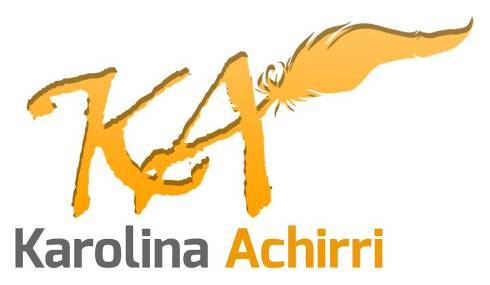 Chopstick Press Ann Arbor , MI , USA IELTS EXAMINERS TIPS
Chopstick Press Ann Arbor , MI , USA IELTS EXAMINERS TIPS
An Academic Guide
to IELTS Speaking and Writing KAROLINA ACHIRRI Karolina Achirri, 2015 Chopstick Press Ann Arbor , Michigan , USA ALL RIGHTS RESERVED. No part of this work covered by the copyright herein may be reproduced, transmitted, stored, or used in any form or by any means graphic, electronic, or mechanical, including but not limited
to photocopying, recording, scanning, digitizing, taping, Web distribution, information networks, or information storage and retrieval systems, except as permitted under Section 107 or 108 of the 1976 United States Copyright Act, without the prior written permission of the publisher. ISBN-13: 978-1517126056 ISBN-10: 1517126053
Table of Content
HOW TO USE THIS BOOK
IELTS Examiners Tips: An Academic Guide to IELTS Speaking and Writing is the outcome of countless hours spent testing as well as assisting students in their preparation for IELTS testing. This textbook provides you with a comprehensive understanding of the test (specifically its Academic Speaking and Writing components). It affords you with all the tools you will need to succeed in your test. The textbook is made extremely useful by real life examples.
If you have already achieved a Band 6 and youre struggling to jump to Bands 7,8 & 9, this book is exactly what you need. The textbook contains of seven chapters and two handy appendices. You dont have to read them in order. I suggest that you pick the information that is most helpful to your study and apply it. The first chapter answers over 60 of the most frequently asked questions by test takers regarding IELTS in general and its Writing and Speaking parts. It is exclusive as it presents an experienced examiners point of view.
The second chapter depicts specific dos and donts in IELTS Speaking Room. It also suggests most examiners biggest pet peeves. There are over 25 examples of things candidates do wrong during their interviews. All of them are explained in a comprehensive way. Chapter 3 tells you how youll be assessed. It explains all Bands in a very approachable way.
Chapter 4 focuses on vocabulary. It offers you 100 words that candidates tend to overuse or misuse at IELTS. I have also created a list of more than 2000 substitutes for such words. All my suggestions aim at Band 7 or higher and include phonetic transcription for correct pronunciation. Last but not least, this chapter includes some native expressions for situational English. The hope is to help you sound more natural during the spoken part of your exam.
Next, Chapter 5 occupies the biggest part of this textbook. It focuses on IELTS Speaking. This chapter contains 114 topics for PART 1 with over 1000 questions examiners might ask you. Later, it specifies over 150 topics for Part 2. Whats more important, I provide you with over 3200 native level words and phrases that will definitely boost your score. Finally, I list over 3600 real questions for Part 3 your examiner is likely to ask.
Chapter 6 deals with IELTS Writing test. It exhibits and analyzes all possible writing tasks and guides you how to write well. You will find a multitude of tips as to what to write and what not to write in both tasks. I explicate appropriate grammatical structures, punctuation, style and quoting way. You will see visual examples and necessary vocabulary for each question type here. I have also included three exemplar reports and essays for each writing task that would surely receive Bands 8 and 9.
This chapter boosts your writing preparation and building skills, and delivers numerous vocabulary pieces for your dream score. Because students often face difficulties with the lack of ideas I have added a bank of 100 most common topics and key ideas that can be directly copied and used where relevant. The last chapter of this book (Chapter 7) offers discourse markers (e.g. linking words for cohesion) for both IELTS Speaking and Writing. You will find here over 20 conversation fillers native speakers use and lots of discourse markers to express your opinion, compare and contrast, quote, agree, ask for clarification, give examples, etc. Finally, the two Appendices at the end of this textbook accommodate your need for quotations (especially welcome in your essays) and your knowledge of tenses, explained in a rare and palpable manner.
Why is this textbook unique? Well An examiners perspective and authentic vocabulary bank make it simply the most practical guide on the market. Feel free to use this textbook as your personal source of all you may need to obtain the top-notch score at your IELTS test. Keep calm and study for your IELTS exam!
CHAPTER 1
IELTS FEARS - Q&A section
Ad astra per aspera (To the stars through difficulty)
GENERAL
Can I use my IELTS score to apply to American universities? Absolutely. IELTS score is currently accepted by most universities in the world. Particular universitys website should supply more detailed information. Whats the main difference between IELTS and TOEFL? Both tests are constructed in a completely different way.
In practice, TOEFL requires students to be able to understand future lectures and seminars at the university. It does not focus on communication as much as IELTS. The latter checks whether you will be able to easily convey your meaning to professors and classmates abroad. Also, IELTS emphasises language accuracy by paying close attention to grammar and lexis.
If my IELTS score is 5.5, what is its TOEFL equivalent? Score Comparisons
| IELTS Score | TOEFL Score |
| 118-120 |
| 8.5 | 115-117 |
| 110-114 |
| 7.5 | 102-109 |
| 94-101 |
| 6.5 | 79-93 |
| 60-78 |
| 5.5 | 46-59 |
| 35-45 |
| 4.5 | 32-34 |
| - | 0-31 |
SPEAKING
What criteria are used to assess my speaking? There are 4 main categories examiners refer to when giving a score, namely Fluency and Coherence , Lexical Resource , Grammatical Range and Pronunciation . Fluency indicates how fluid your speech is, how many pauses you make.
It is not about your speed but rather about hesitation, searching for words. The more you pause the lower your fluency score. Coherence means you speak logically and all the facts match. Your speech has content that makes sense to the listener. The more Why/what do you mean? you hear from the examiner, the lower your coherence is. Lexical Resource represents vocabulary you use throughout your test.
If you are targeting scores from 6 to 9, you need to make sure that your answers contain idioms and correct collocations. The more the better but be careful not to sound too artificial. Grammatical Range focuses on your sentence structures and grammar mistakes. Be sure to use a variety of structures, from simple sentences to complex ones. The number of mistakes matters as well if you want to cross over band 6. The fewer mistakes the better.
Pronunciation is not only your accent but also particular sounds. Is your speech easy to understand? Do you use correct intonation and chunking in phrases? Many students worry that American accent is treated unfairly, as IELTS is a British test. I can assure you this is not the case. Generally speaking, examiners listen for elements of native accents, be it American, British, Australian or Canadian. What shall I focus on for Band 6 and higher? Thats a big issue. There seems to be a significant gap between Bands 6 and 7.
Next page
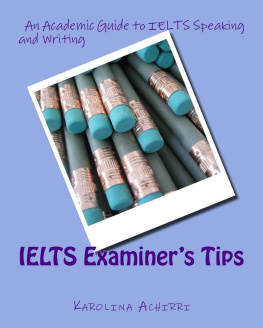

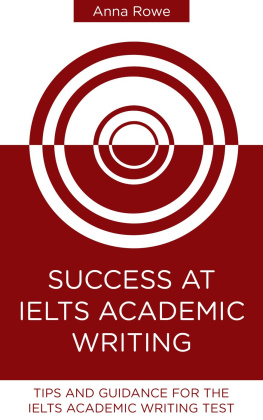
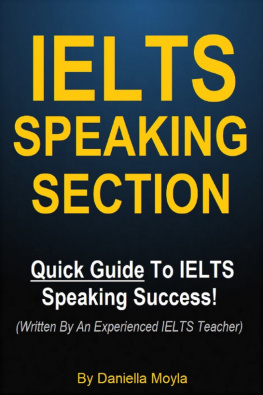
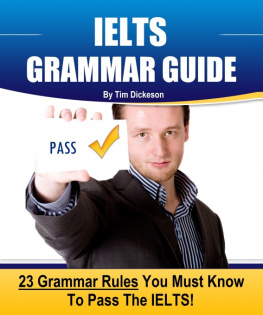
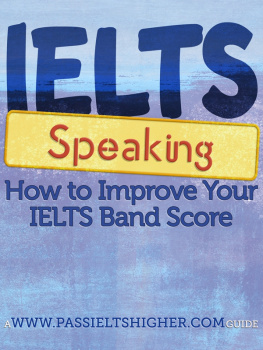

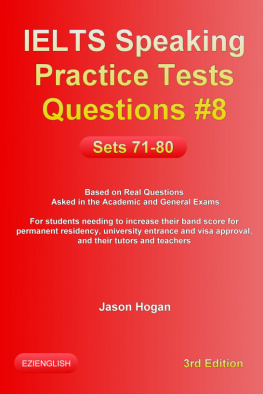

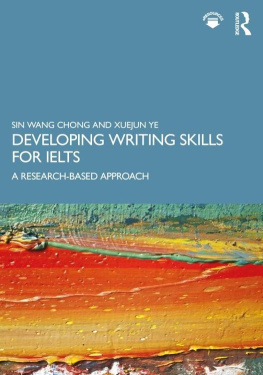
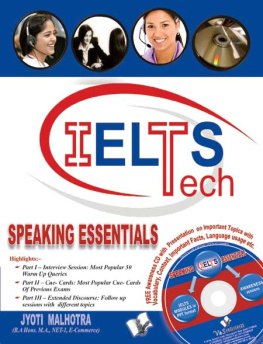
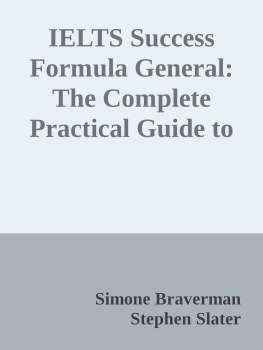
 Chopstick Press Ann Arbor , MI , USA IELTS EXAMINERS TIPS
Chopstick Press Ann Arbor , MI , USA IELTS EXAMINERS TIPS